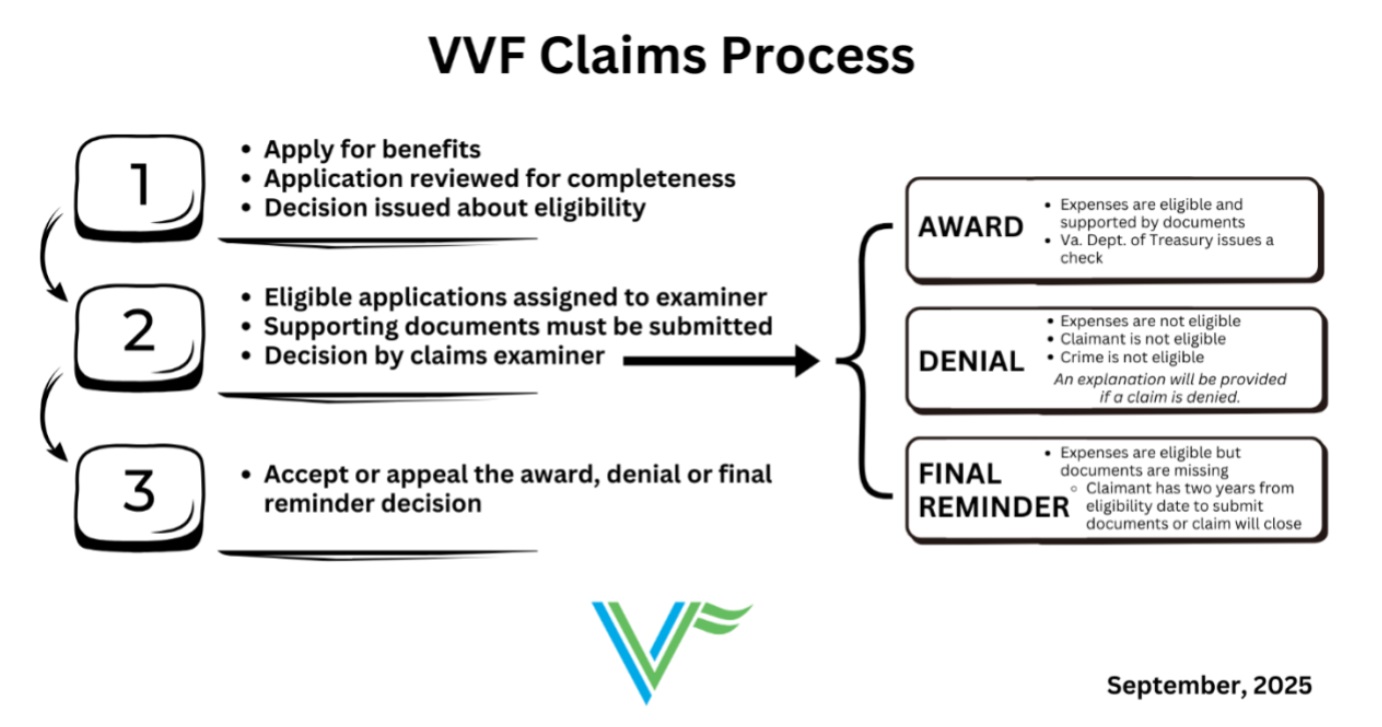How Compensation Works

The Claims Process, Explained:
Step 1:
- Apply for benefits
- Application reviewed for completeness
- Decision issued about eligibility
- Eligible applications assigned to examiner
- Supporting documents must be submitted
- Decision by claims examiner
- Possible decisions include:
- Award
- Expenses are eligible and supported by documents
- Va. Dept. of Treasury issues a check
- Denial (An explanation will be provided if a claim is denied.)
- Expenses are not eligible
- Claimant is not eligible
- Crime is not eligible
- Final Reminder
- Expenses are eligible but documents are missing
- Claimant has two years from eligibility date to submit documents or claim will close
- Accept or appeal the award, denial or final reminder decision
Code of Virginia § 19.2-368.11:1(G) states that the Virginia Victims Fund is the payer of last resort. This statute requires claimants to exhaust all available collateral resources before VVF can make payment. The resources relevant in each claim depend on both the crime type and the resources available to the victim. This includes but is not limited to:
- Health insurance benefits
- Homeowners and renters insurance
- Auto insurance
- Medicare/Medicaid
- Social security benefits
- Healthcare provider financial assistance/charity care
- Life insurance
- Funeral/burial insurance
- Deceased victim's estate in excess of $25,000
- Disability insurance
- Workers compensation
- Sick leave and/or short term disability
- Court-ordered restitution
- Civil suits*
*Attorney information is only needed if civil suit is requesting expenses which were also requested through VVF. The Fund cannot consider payment for pain and suffering and non-eligible property damage. See Non-Eligible Expenses for additional information.
People impacted by crime in Virginia can apply for assistance with reasonable and necessary expenses that arise from the crime. These can include:
- Medical Expenses
- Funeral Expenses
- Lost Wages
- Prescriptions
- Home Security
- Crime-Scene Clean-Up
- Moving
- Temporary Housing
- Mileage
- to medical appointments
- to court-related appointments for child victims
- Loss of Support
- From an offender removed from the home in domestic violence or child sexual-assault cases
- Dependents of homicide victims
- Counseling
- For direct victims
- For children who witness violence against caretaker
- For the immediate family of a homicide victim
VVF cannot reimburse applicants for the following expenses:
- Replacement of stolen vehicles, cellphones, money, or other personal property
- Legal/ attorney fees
- Compensation for pain and suffering
- Fees related to missed doctors' appointments
- Towing/vehicle recovery
- Injuries resulting from the operation of a vehicle; unless the incident was a DUI, Felony Hit & Run or the injuries were intentionally inflicted through the use of a vehicle
- VVF cannot pay any expenses incurred while a person is in the custody of Department of Justice (DOJ)
- If a medically necessary device is damaged in the crime, like glasses, dentures, hearing aids, or prosthetic limbs, these items can be replaced. This loss should appear in the police report or in a statement from the officer.
- Windows and locks may be replaced in a breaking and entering case.
- When clothing or bedding are taken as evidence, VVF may pay for the purchase of a replacement.
